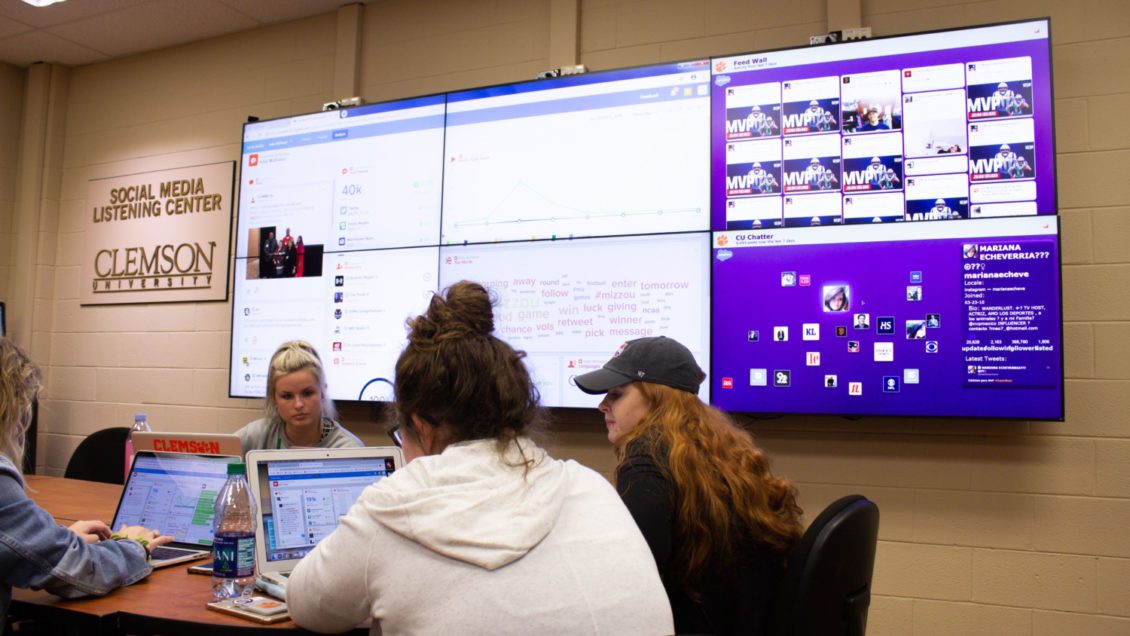
CLEMSON — Police officers, EMS workers and volunteers are the unsung heroes of Clemson game day. They keep things running smoothly when the usual number of people on campus quadruples and trucks, tents and coolers fill every empty parking space. These heroes are spread all over campus, but their home base is located at the Incident Command Center.
This fall, faculty and students in Clemson’s communication department are set to join this roster of heroes, and they’ll use the university’s Social Media Listening Center to provide a service that has never before been used by the game day security team. Assistant professor Andrew Pyle has been named the university’s first Division of Public Safety Faculty Fellow and he will head up social media monitoring efforts before, during and after all 2019 home football games.
“Our security team does an amazing job on game days, but to ask them to also monitor the high volume of social media related to that day would add to their already large workload,” Pyle said. “We are thrilled to use our expertise in social media monitoring to provide another set of eyes and ears for this team.”
Pyle said his appointment as fellow sprang from a talk with Greg Mullen, Clemson University’s police chief and associate vice president for public safety. Pyle and students had gained positive attention for their work using social media to aid in crisis communication during Hurricane Florence with the South Carolina Emergency Management Division and Mullen said he was interested in using Pyle’s expertise to bring Clemson security on game days up to speed as it relates to social media tracking.

The listening center’s software allows it to monitor and measure social media conversations using some of the most powerful social analytics software available. In the case of game day monitoring, Pyle said his team will build “profiles” to look out for both unexpected, spontaneous threats and issues that the game day security team has flagged as potential issues.
Mullen witnessed the effectiveness of social monitoring during his tenure as chief of police in Charleston, namely during large-scale events like the city’s Cooper River Bridge Run. While many police departments must hire companies that specialize in this kind of monitoring, Mullen said Clemson benefits from already having the technology and expertise on campus.
“Our team in the incident command center is tasked with looking at the big picture of game day security, and social media monitoring is a great way to help bring that picture into focus,” Mullen said. “Dr. Pyle and students will be able to carefully select keywords to look out for before and during the game, but they’ll also be flexible enough to begin new searches and monitor different conversations online in real time.”

Mullen said the need for this type of monitoring has never been more apparent. He cited a recent report from the U.S. Secret Service, which found that 79 percent of those who perpetrated mass attacks in 2017 did so after engaging in threatening or concerning communications, much of which occurred over social media. He said it is now incumbent upon law enforcement to monitor these types of communications leading up to large events.
Mullen is also happy to provide hands-on learning experiences for students who will volunteer to aid Pyle in social monitoring. He said the need for security that utilizes social media monitoring will only increase in the future, so students with practical experience on some of the biggest game days in college football should stand out in the job market.
“Law enforcement agencies all over are hiring people with these specific skills,” Mullen said. “It wouldn’t be hard for an employer to choose between someone with only simulated experience and someone who was part of an incident command center at Clemson for seven Saturdays in 2019 providing threat information identified over social media.”
Pyle was able to perform a “dry run” for his approach to game day during Clemson’s spring game, and he said it was an informative preview of possible hurdles his team could face. He learned that searching across a variety of channels is important and even across multiple feeds for the same keywords and hashtags.
Pyle predicts the primary issue on game days will be the sheer volume of messages as attention in the area and around the country is focused on Clemson football. Even during the spring game, he found that a poorly tailored search using the listening center’s technology would become overloaded with irrelevant information.
With every new game, these searches and keyword profiles will improve and be less affected by the overwhelming “noise” on social media. However, unlike most researchers, Pyle hopes that his findings on game days are routine and, in his words, boring.
“The best-case scenario is we go through seven home games and the worst thing we see is friendly banter between excited fans,” Pyle said, “but we’ll gladly be there just in case.”
CUPD and Clemson Athletics have instituted more comprehensive measures to help ensure the continued safety of fans, donors, coaches, student-athletes and visitors at Memorial Stadium for football games in 2019. Walk-through metal detectors will be present at all entrances in addition to the clear bag policy instituted in 2016. As a result, Clemson is asking fans to plan ahead and allow extra time to enter the stadium and listen to security personnel at the gates for instructions.
Get in touch and we will connect you with the author or another expert.
Or email us at news@clemson.edu

